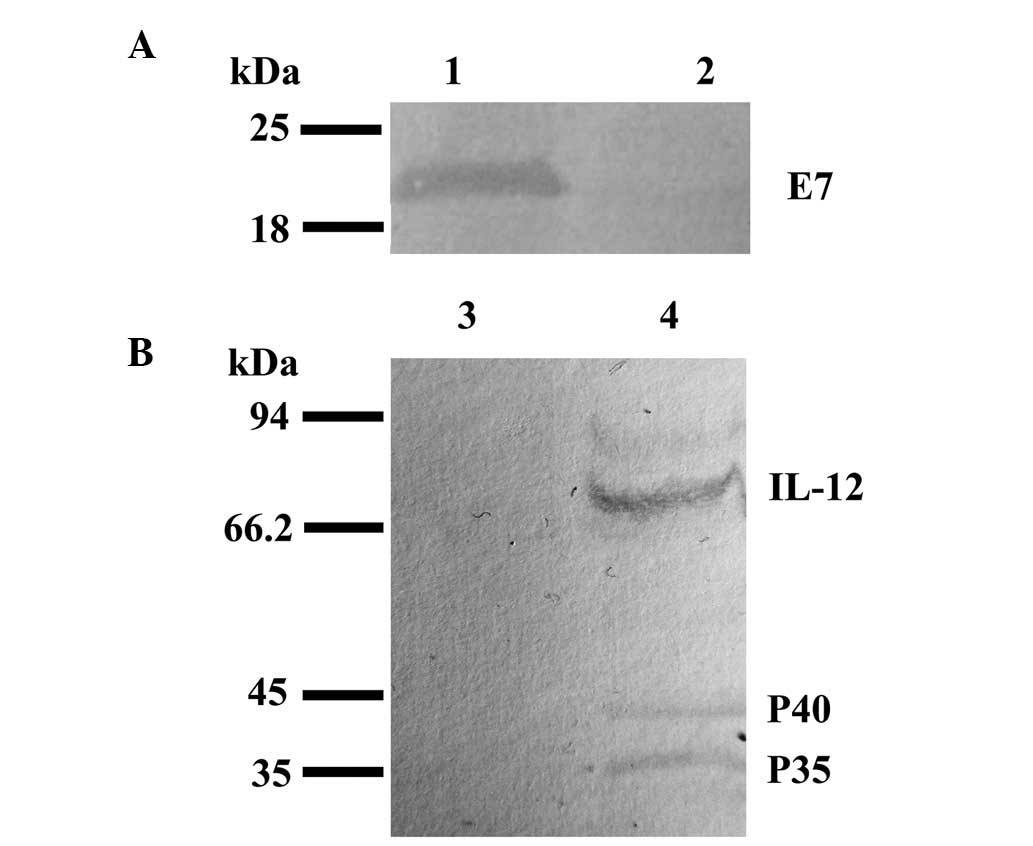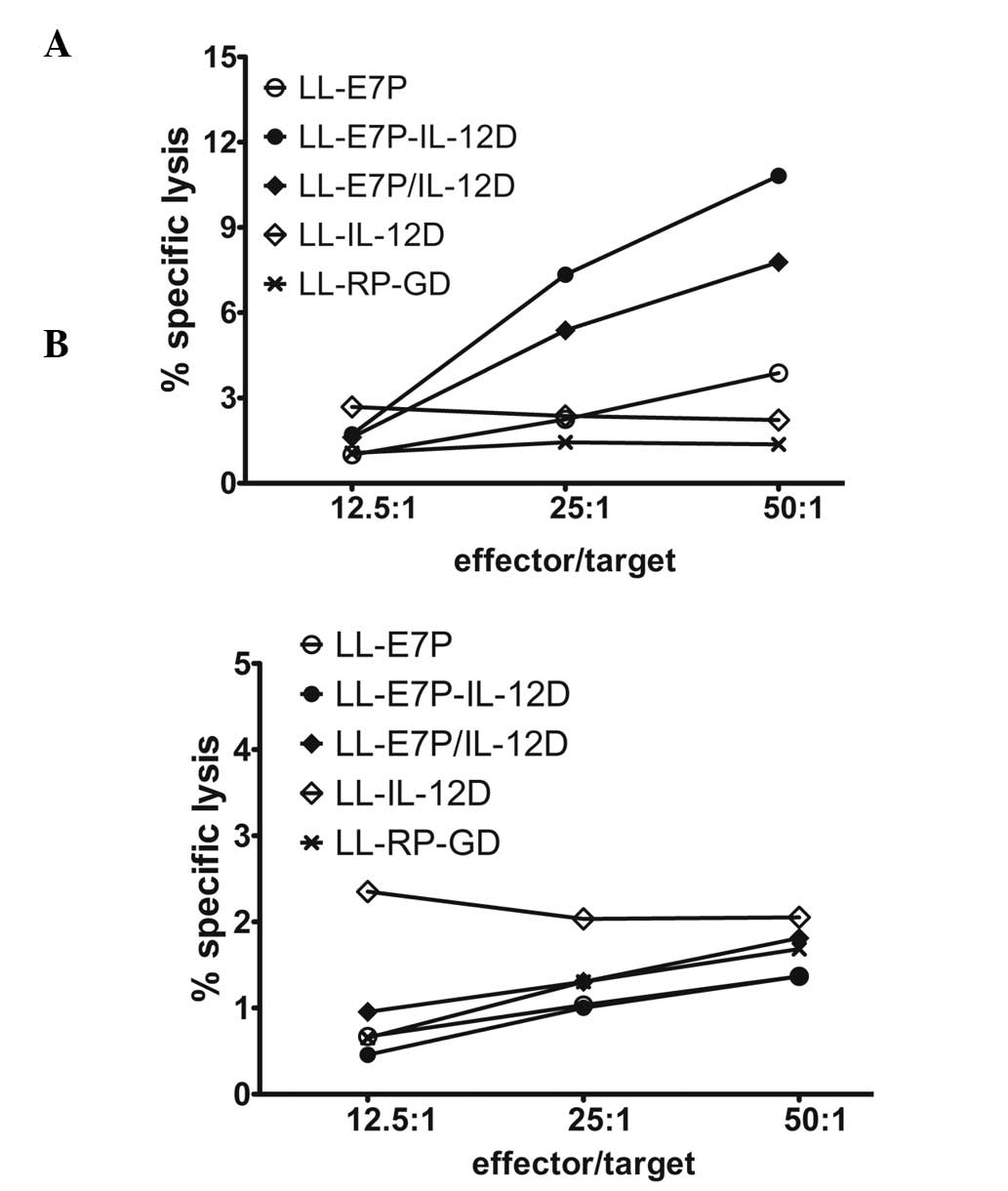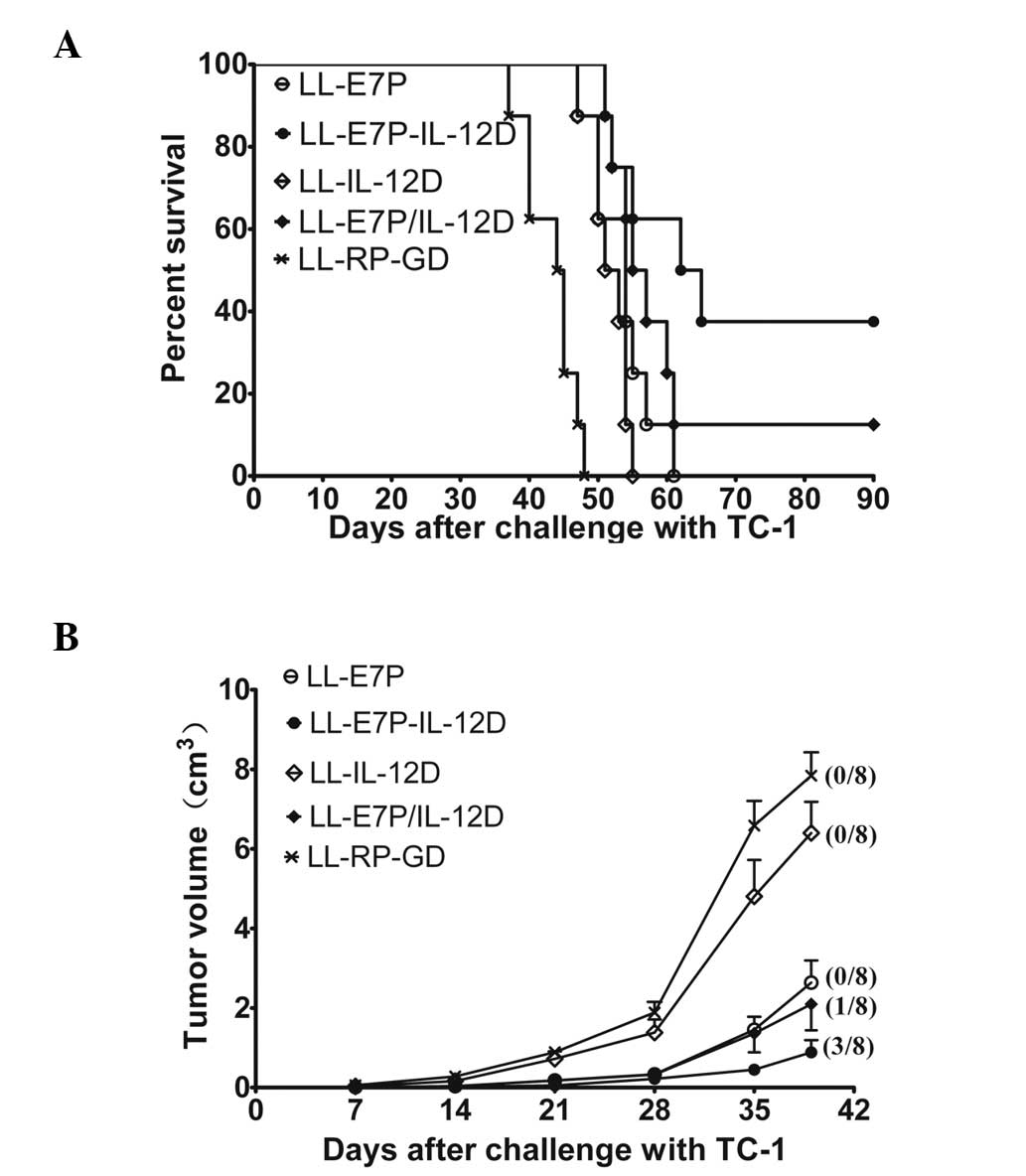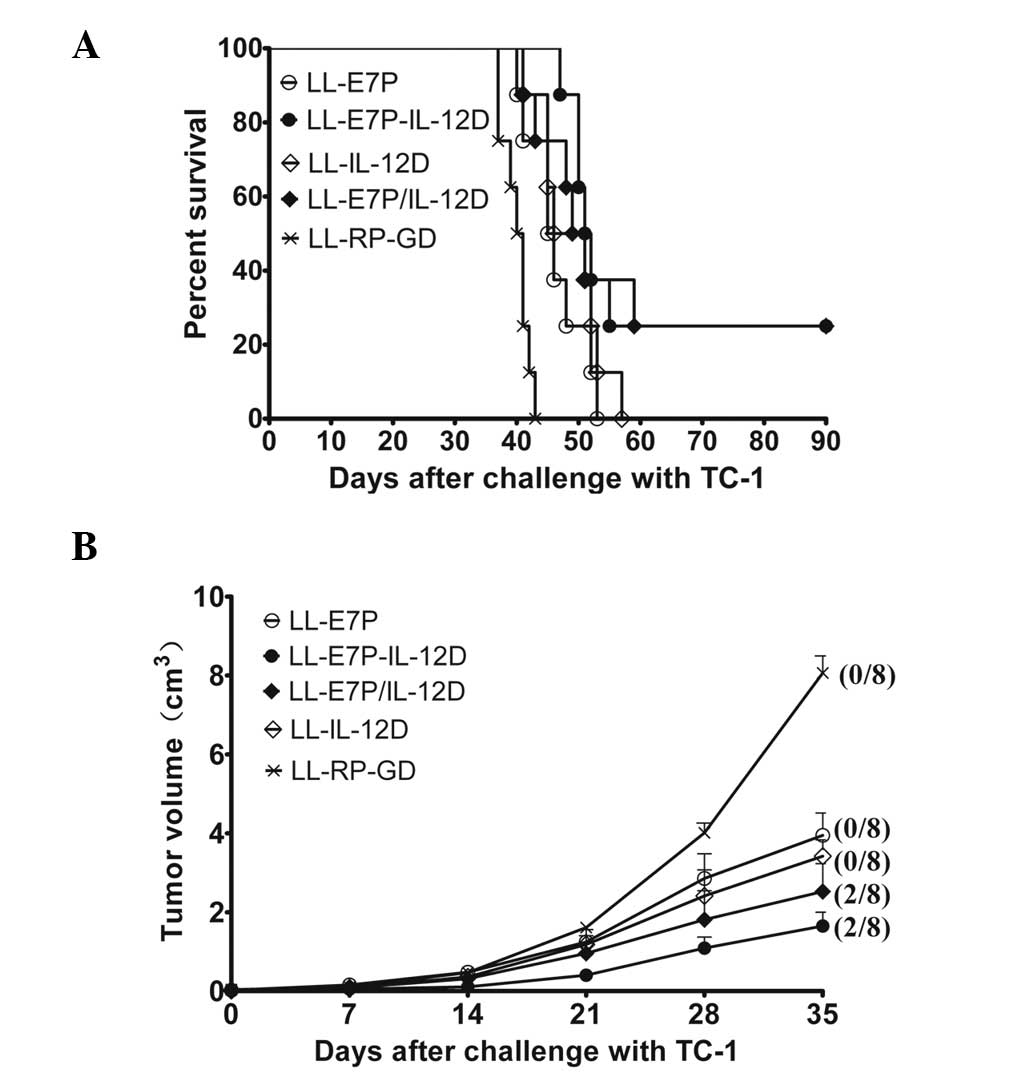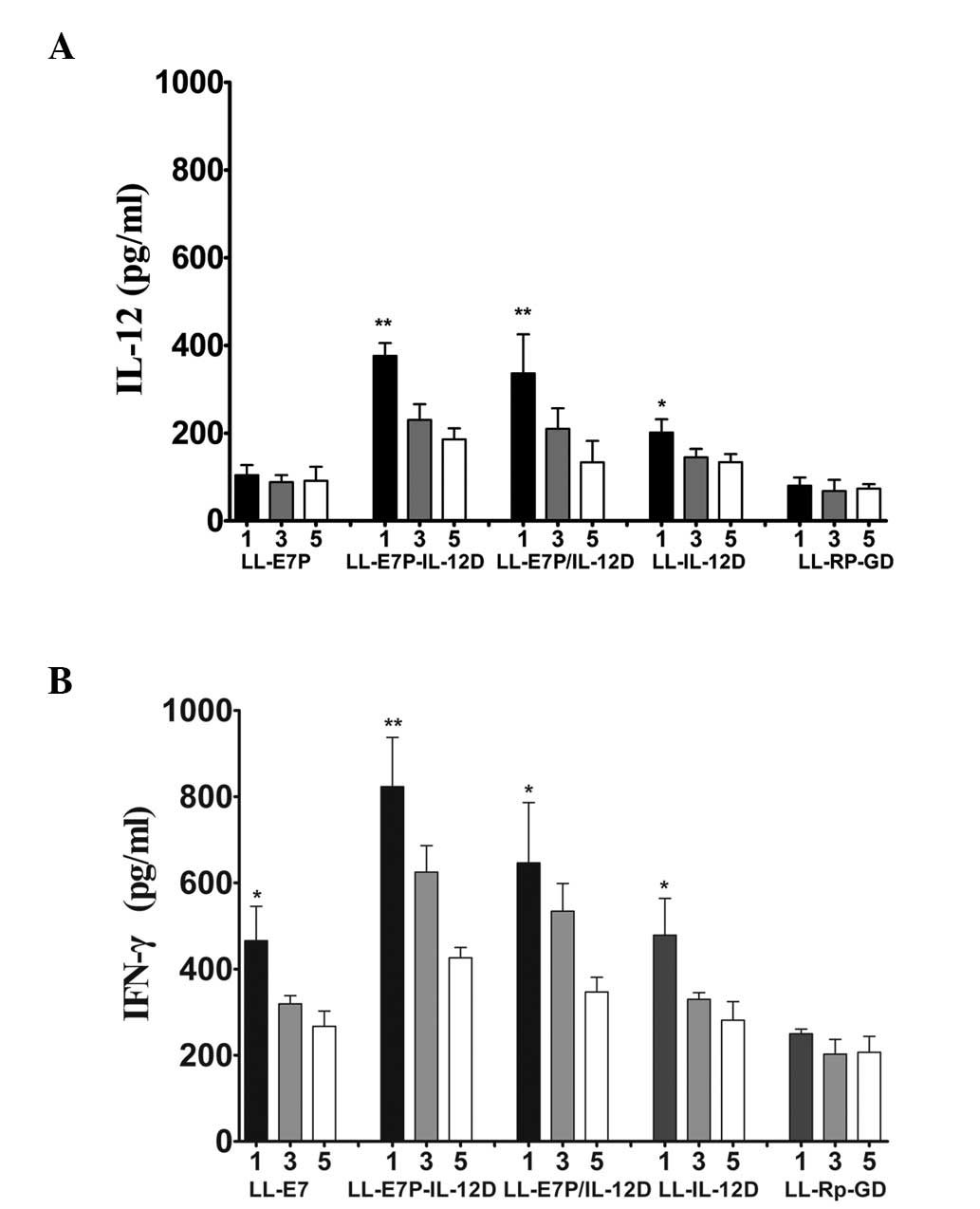|
1
|
Mitragotri S: Immunization without
needles. Nat Rev Immunol. 5:905–916. 2005. View Article : Google Scholar : PubMed/NCBI
|
|
2
|
Holmgren J and Czerkinsky C: Mucosal
immunity and vaccines. Nat Med. 11(Suppl 4): S45–S53. 2005.
View Article : Google Scholar : PubMed/NCBI
|
|
3
|
Neutra MR and Kozlowski PA: Mucosal
vaccines: the promise and the challenge. Nat Rev Immunol.
6:148–158. 2006. View Article : Google Scholar : PubMed/NCBI
|
|
4
|
Bermúdez-Humarán LG, Kharrat P, Chatel JM
and Langella P: Lactococci and lactobacilli as mucosal delivery
vectors for therapeutic proteins and DNA vaccines. Microb Cell
Fact. 10(Suppl 1): S42011.PubMed/NCBI
|
|
5
|
Bahey-El-Din M: Lactococcus
lactis-based vaccines from laboratory bench to human use: an
overview. Vaccine. 30:685–690. 2012. View Article : Google Scholar
|
|
6
|
Wells JM and Mercenier A: Mucosal delivery
of therapeutic and prophylactic molecules using lactic acid
bacteria. Nat Rev Microbiol. 6:349–362. 2008. View Article : Google Scholar : PubMed/NCBI
|
|
7
|
Moorthy G and Ramasamy R: Mucosal
immunisation of mice with malaria protein on lactic acid bacterial
cell walls. Vaccine. 25:3636–3645. 2007. View Article : Google Scholar : PubMed/NCBI
|
|
8
|
Villa LL, Costa RL, Petta CA, et al:
Prophylactic quadrivalent human papillomavirus (types 6, 11, 16,
and 18) L1 virus-like particle vaccine in young women: a randomised
double-blind placebo-controlled multicentre phase II efficacy
trial. Lancet Oncol. 6:271–278. 2005. View Article : Google Scholar
|
|
9
|
Hildesheim A, Herrero R, Wacholder S, et
al: Effect of human papillomavirus 16/18 L1 viruslike particle
vaccine among young women with preexisting infection: a randomized
trial. JAMA. 298:743–753. 2007. View Article : Google Scholar : PubMed/NCBI
|
|
10
|
Boulet G, Horvath C, Vanden Broeck D,
Sahebali S and Bogers J: Human papillomavirus: E6 and E7 oncogenes.
Int J Biochem Cell Biol. 39:2006–2011. 2007. View Article : Google Scholar
|
|
11
|
Bermúdez-Humarán LG, Cortes-Perez NG,
Lefèvre F, et al: A novel mucosal vaccine based on live Lactococci
expressing E7 antigen and IL-12 induces systemic and mucosal immune
responses and protects mice against human papillomavirus type
16-induced tumors. J Immunol. 175:7297–7302. 2005.
|
|
12
|
Jin HS, Park EK, Lee JM, et al:
Immunization with adenoviral vectors carrying recombinant IL-12 and
E7 enhanced the antitumor immunity to human papillomavirus
16-associated tumor. Gynecol Oncol. 97:559–567. 2005. View Article : Google Scholar
|
|
13
|
Lin CT, Tsai YC, He L, et al: DNA vaccines
encoding IL-2 linked to HPV-16 E7 antigen generate enhanced
E7-specific CTL responses and antitumor activity. Immunol Lett.
114:86–93. 2007. View Article : Google Scholar : PubMed/NCBI
|
|
14
|
Hibbitts S: TA-CIN, a vaccine
incorporating a recombinant HPV fusion protein (HPV16 L2E6E7) for
the potential treatment of HPV16-associated genital diseases. Curr
Opin Mol Ther. 12:598–606. 2010.PubMed/NCBI
|
|
15
|
Wick DA and Webb JR: A novel, broad
spectrum therapeutic HPV vaccine targeting the E7 proteins of
HPV16, 18, 31, 45 and 52 that elicits potent E7-specific CD8T cell
immunity and regression of large, established, E7-expressing TC-1
tumors. Vaccine. 29:7857–7866. 2011. View Article : Google Scholar
|
|
16
|
Lin KY, Guarnieri FG, Staveley-O'Carroll
KF, et al: Treatment of established tumors with a novel vaccine
that enhances major histocompatibility class II presentation of
tumor antigen. Cancer Res. 56:21–26. 1996.
|
|
17
|
Zhang M, Zhang F, Jian X, et al: Cloning
and mutation of human papillomavirus type 16 (Xinjiang strain) E7
gene. Biotechnology. 13:4–6. 2003.(In Chinese).
|
|
18
|
Tao L, Pavlova SI, Ji X, Jin L and Spear
G: A novel plasmid for delivering genes into mammalian cells with
noninvasive food and commensal lactic acid bacteria. Plasmid.
65:8–14. 2011. View Article : Google Scholar : PubMed/NCBI
|
|
19
|
Li YJ, Liu HH and Zhang FC: Co-delivery of
exogenous protein and DNA into mammalian cells with Lactococcus
lactis. Xi Bao Yu Fen Zi Mian Yi Xue Za Zhi. 28:1328–1330.
2012.(In Chinese).
|
|
20
|
Audibert F: Adjuvants for vaccines, a
quest. Int Immunopharmacol. 3:1187–1193. 2003. View Article : Google Scholar : PubMed/NCBI
|
|
21
|
Dubensky TW Jr and Reed SG: Adjuvants for
cancer vaccines. Semin Immunol. 22:155–161. 2010. View Article : Google Scholar : PubMed/NCBI
|
|
22
|
Steidler L, Robinson K, Chamberlain L, et
al: Mucosal delivery of murine interleukin-2 (IL-2) and IL-6 by
recombinant strains of Lactococcus lactis coexpressing antigen and
cytokine. Infect Immun. 66:3183–3189. 1998.
|
|
23
|
Guimarães VD, Innocentin S, Lefèvre F, et
al: Use of native lactococci as vehicles for delivery of DNA into
mammalian epithelial cells. Appl Environ Microbiol. 72:7091–7097.
2006.PubMed/NCBI
|
|
24
|
Gram GJ, Fomsgaard A, Thorn M, Madsen SM
and Glenting J: Immunological analysis of a Lactococcus
lactis-based DNA vaccine expressing HIV gp120. Genet Vaccines
Ther. 5:32007.
|
|
25
|
Innocentin S, Guimarães V, Miyoshi A, et
al: Lactococcus lactis expressing either Staphylococcus
aureus fibronectin-binding protein A or Listeria
monocytogenes internalin A can efficiently internalize and
deliver DNA in human epithelial cells. Appl Environ Microbiol.
75:4870–4878. 2009. View Article : Google Scholar
|
|
26
|
Li YJ, Li Xinping and Zhang FC: The
effects of Lactococcus lactis carrying the interleukin-12
(IL-12) gene or recombinant IL-12 protein via different routes
mediated antitumor activity. Xi Bao Yu Fen Zi Mian Yi Xue Za Zhi.
29:392–395. 2013.(In Chinese).
|
|
27
|
Cortes-Perez NG, Lefèvre F, Corthier G,
Adel-Patient K, Langella P and Bermúdez-Humarán LG: Influence of
the route of immunization and the nature of the bacterial vector on
immunogenicity of mucosal vaccines based on lactic acid bacteria.
Vaccine. 25:6581–6588. 2007. View Article : Google Scholar
|
|
28
|
Bermúdez-Humarán LG, Cortes-Perez NG, Le
Loir Y, et al: An inducible surface presentation system improves
cellular immunity against human papillomavirus type 16 E7 antigen
in mice after nasal administration with recombinant lactococci. J
Med Microbiol. 53:427–433. 2004.
|
|
29
|
Leonard JP, Sherman ML, Fisher GL, et al:
Effects of single-dose interleukin-12 exposure on
interleukin-12-associated toxicity and interferon-gamma production.
Blood. 90:2541–2548. 1997.PubMed/NCBI
|
|
30
|
Huber VC, Arulanandam BP, Arnaboldi PM, et
al: Delivery of IL-12 intranasally leads to reduced IL-12-mediated
toxicity. Int Immunopharmacol. 3:801–809. 2003. View Article : Google Scholar : PubMed/NCBI
|















